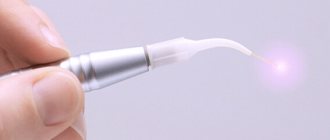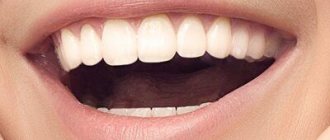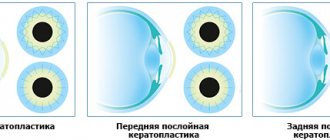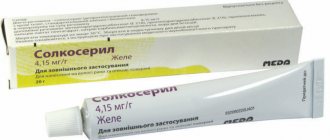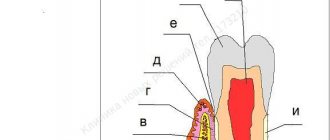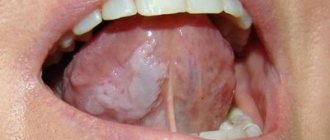Author of the article:
Soldatova Lyudmila Nikolaevna
Candidate of Medical Sciences, Professor of the Department of Clinical Dentistry of the St. Petersburg Medical and Social Institute, Chief Physician of the Alfa-Dent Dental Clinic, St. Petersburg
The human oral cavity is often called a mirror of the state of the body. A qualified dentist, after performing a visual examination of the oral mucosa and teeth, can determine what chronic diseases the patient has and advise him to see a specific doctor. Thus, diseases of the endocrine or nervous system, gastrointestinal tract or blood diseases can be diagnosed using the oral cavity.
At the same time, if there are chronic diseases in the oral cavity, then they, in turn, can become a provoking factor for the development of rheumatism, pyelonephritis and some other diseases. Remember how, for example, pregnant women before giving birth and patients before a planned operation need to obtain a certificate of oral sanitation. Therefore, prevention is very important for everyone. Moreover, we are talking not only about a beautiful and healthy smile, but also about health in general, and also, of course, about those funds from the family budget that will have to be spent on treatment at the dentist.
Prevention of oral diseases
When they talk about the prevention of oral diseases, they primarily mean:
- Self-regular oral care.
- Periodic visits to the dental clinic.
Why do you need to take care of your mouth? The fact is that after each meal, food particles remain on the teeth and mucous membranes of the mouth, as a result, upon contact with saliva, bacteria and microbes begin to multiply in the mouth, which ultimately leads to the appearance of caries, bad breath, plaque and dental plaque. stone
Some people, unfortunately, do not understand the importance of this procedure, erroneously claiming that animals don’t brush their teeth or anything. But we must not forget that animals live much shorter lives, and, most importantly, they monitor their diet, consuming sufficient quantities of food of plant origin.
Prevention of caries
This pathological process of changes in enamel and hard tissues affects up to 98% of the entire population of the planet, so the relevance of preventive procedures for this disease does not need to be confirmed.
Measures to prevent the occurrence and development of caries:
- It is important to monitor your diet: protein foods, foods that contain large amounts of amino acids, trace elements and vitamins (especially calcium and phosphorus), are an excellent non-drug method for preventing caries.
- At the same time, you should limit your carbohydrate intake, give preference to sweeteners, and avoid drinking too hot or too cold drinks.
- Regular and thorough oral hygiene, which is accompanied by the use of toothpastes that have a therapeutic and prophylactic effect.
- The use of various kinds of complexes of vitamins, macro- and microelements, which the body (especially a growing one) needs most.
- Applications, rinses, baths, electrophoresis, which are carried out by various remineralizing agents.
Brushing your teeth with a toothbrush
The most important thing in preventing oral diseases is brushing your teeth. Every person, regardless of age, including children, should brush their teeth morning and evening. Moreover, observing certain rules.
- You need to brush your teeth for at least five minutes.
- Brush your teeth with rotational movements, otherwise, if you brush straight, the plaque will simply be driven into the gum pockets and between the teeth.
- Do not press the brush too hard to avoid damaging the enamel.
- When brushing your teeth, mentally divide all your teeth into four sections and brush each one separately so as not to spread germs throughout the jaw.
- You need to brush not only the teeth from above, but also near the gums, at the base, and also the gums themselves.
- Dentists recommend placing the brush at an angle of 45 degrees when brushing your teeth.
- First you need to brush the far teeth of the upper jaw, then the front teeth, turning the brush vertically, and then start cleaning the teeth of the lower jaw. Finish brushing your teeth by massaging your gums and brushing your tongue.
- In this case, you should take no more than a pea-sized amount of toothpaste.
Remineralization of teeth
Remineralizing dental therapy is the introduction of mineral components, such as calcium, phosphorus, and fluorine compounds into tooth enamel, helping to stop the demineralization process or the disappearance of stains (extremely rare). The process of demineralization (destruction of enamel) in the oral cavity occurs constantly. Saliva in the oral cavity has remineralizing properties, which make it possible to stop caries in the stain stage, but only by 50%, so remineralizing therapy in a dental office is simply necessary.
Methodology of the procedure. Before carrying out remineralization therapy, it is necessary to have the tooth or teeth professionally cleaned by a dentist. Next, a remineralizing preparation is rubbed into the enamel using a special applicator. The effectiveness of this procedure is revealed by repeating the procedure three times in the dentist’s office every day or every other day. The frequency of the procedure is at least 3-4 times a year.
Remineralization of enamel at home allows you to enhance and prolong the effect of care that began in the dentist’s office. To do this, you need to make a soft and durable individual mouthguard. After you have the mouth guard in your hands, the dentist will explain the technique and method of using the mouth guard with various medications at home. To make a custom mouth guard, you need to take a dental impression (impression).
Recommendations: after the remineralization procedure, refrain from eating and drinking for about 2 hours.
How to choose the right toothbrush
Just as important as brushing your teeth is choosing a good toothbrush. Experts advise purchasing a brush with artificial bristles, which is considered more hygienic, practical and durable. As for the optimal degree of hardness, if the patient does not have any special indications, a regular brush of medium hardness will suit him.
It is also worth paying attention to the size of the toothbrush - optimally it should cover three teeth.
We must not forget that the brush needs to be changed periodically. It’s difficult to say how often to do this, because for some the brush can wear out in a month, while for others it can last two to three months. This depends on many factors, in particular, how often you brush your teeth, with what force you do it, how long the procedure lasts, and what toothpaste you use.
Therefore, some dentists advise purchasing toothbrushes with colored tufts of bristles, which are indicators. On a new brush they are always bright, and when the bristles wear out, they take on a pale blue tint. Noticed this on your toothbrush? It's time to go to the pharmacy for a new one.
If your brush does not have such indicators, simply change it at least once a quarter.
Recently, electric toothbrushes have become popular, although the attitude towards them from professional dentists is rather ambiguous. Therefore, before purchasing such a modern brush, it is better to consult your doctor.
Battery-powered teeth polishing devices are also available on the market. According to dentists, they can be used, but not often, as they can damage the enamel.
Dental prevention in children
Healthy teeth are an integral part of a child’s carefree childhood. Proper care, absence of caries and other diseases guarantees oral health. Therefore, it is necessary to carry out timely dental prophylaxis in children.
What can happen to children's teeth?
Children can be classified as a special group of patients. In pediatric dentistry they are always at risk. After all, their body is just learning to work. All protective mechanisms are not yet perfect, and the immune system reacts quite violently to aggressive external influences.
The following factors will contribute to the even greater development of caries, as well as its spread and complications: thin enamel, imperfect immunity, only partial mineralization of teeth, and the anatomical and physiological characteristics of the child.
Caries is one of the sources of chronic infections. It can be the cause of many somatic pathologies. Such as diseases of the gastrointestinal tract, kidney diseases, etc. And caries can also cause complications and even threaten the health of children, not to mention various malocclusion pathologies.
Malocclusion can cause children to become isolated in society, withdrawn, and perform poorly at school. Everything in our body is certainly interconnected. Therefore, it is important to start oral hygiene in children on time and visit the dentist on time.
Caries and malocclusion are some of the consequences of poor dental care
It is possible to prevent caries in a child already during pregnancy and breastfeeding.
At the planning stage of pregnancy, a woman needs to ensure that her body is filled with the necessary vitamins and microelements for the full development of the child. Carry out a complete sanitation of the oral cavity, because caries is a breeding ground for infections, and the formation of organs, including teeth, occurs already in the seventh week of pregnancy. And already at the end of the first half, the baby’s teeth begin to materialize.
Doctors also recommend taking tablets that contain only 1 mg of fluoride. This allows you to achieve two effects at once: the fetus develops strong teeth, and the woman does not wash out fluoride from the body, which ensures that health is maintained at the proper level. Also, do not forget about calcium, which both the unborn child and the mother herself need.
Another important factor in the formation of healthy teeth in a baby is the mother’s regular visits to the dental office. The child takes all the missing “building materials” for his body from the woman’s reserves. And this, in turn, can lead to a lack of vitamins and microelements, and therefore can cause caries, its complications and other diseases of the oral cavity.
A balanced diet will help stop the occurrence of caries and other diseases.
When preventing caries of primary teeth in children, it is important to provide adequate nutrition. Your child's diet should include calcium from dairy products. For better absorption of calcium, vitamin D is also necessary, which can be obtained from fish or exposure to sunlight. Therefore, take your child for walks in the fresh air more often - this helps strengthen the child’s teeth and immunity.
As your child grows, adjust his diet. Dentists recommend excluding some dishes altogether, while adding others, on the contrary. Here are some foods that are considered harmful not only to a child’s teeth, but also to an adult’s:
- Any chocolate products;
- sweets, pastries and cakes;
- fruits with high acidity;
- sweet carbonated drinks;
- concentrated juices, as well as homemade compote, due to their high sugar content.
These products also harm the gastrointestinal tract, causing an imbalance in the acid-base balance. But they can be replaced with more useful ones to avoid dental problems:
- Green tea. It contains natural antioxidants, which slows down the process of caries formation;
- lime. Even though it's citrus. It is rich in fluoride and calcium;
- carrot. This vegetable is rich in vitamins, and its dense structure allows you to cleanse your teeth of plaque.
Dentists also have their own opinion about snacks between main meals. They carry a fairly large factor in the development of caries in children, because they do not allow the acid balance to be restored. Therefore, give preference to solid foods such as apples, carrots, and pears. They do the best job of removing plaque that forms on teeth throughout the day.
It is necessary to practice oral hygiene when a child’s first tooth appears.
It is advisable for the baby to wipe his teeth with a soft cloth or gauze after eating and before going to bed in the direction: from the edge of the gums to the surface of the teeth. As the child gets used to this procedure, a toothbrush with soft bristles and a small head should be used. To prevent baby teeth, it is also recommended to use special wipes with xylitol, which provide protection against microbes.
Dentists also recommend using toothpastes containing fluoride. Such pastes are especially necessary for children with an increased risk of caries. Until the age of 12, parents must supervise the cleaning process. You should not allow your child to swallow fluoride toothpaste. As your baby gets older, you can choose toothpaste with a higher concentration of fluoride.
Always pay attention to the composition of the toothpaste, its quality and purpose. Give preference to those that contain calcium, fluorine, phosphorus to strengthen the enamel, and also correspond to the child’s age.
The next step on the path to healthy teeth is brushing.
It is very important to instill in your child the habit of brushing their teeth every day. This way he realizes the importance of hygiene much earlier. And he will learn to take responsibility for his dental health.
To make the brushing process enjoyable, you need to choose the right toothbrush. At a young age, it is better to give preference to soft bristles so as not to damage the delicate mucous membrane of the gums. They are usually sold in stores labeled “soft”. As you get older, you can switch to medium-hard toothbrushes. They will provide a more thorough cleaning of plaque. Brushes are labeled “medium”.
Only with the help of toothpaste and a brush can you achieve almost complete cleansing of stuck food and plaque. But there is one more important point! Brushes need to be changed promptly, approximately once every three months. With prolonged use, bacteria remain and multiply on the bristles, making the cleaning process less effective.
Take your child to the dental office at least three times a year.
Prevention in pediatric dentistry is not complete without an experienced specialist. Therefore, make it a rule to see a dentist. Only through a professional examination can the development of caries and other oral diseases be detected and prevented in the early stages. If your child does develop early caries, he will promptly carry out all the necessary tests and prescribe treatment. Most often, the following procedures are recommended for children.
- Fluoridation
The doctor coats the child’s teeth with a special innovative composition. It saturates the enamel with all the necessary microelements. Thanks to this procedure, the teeth will become more resistant to aggressive external influences.
- Fissure sealing
This method of treatment and prevention is done both for preschool children with baby teeth and for teenagers. It is advisable to do this procedure within a month or a month and a half from the moment the first molars appear. The doctor closes the deep grooves on the chewing surface of the tooth. Thus, it is possible to eliminate the accumulation of pathogenic bacteria in hard-to-reach places. To do this, experts use fluoropolymer sealant that is resistant to saliva, liquids and acids.
Fissure sealing is one of the necessary methods of prevention
At the first stage, the dentist thoroughly cleans the teeth using a professional brush and toothpaste. Then he applies an acidic substance to the grooves of the pits that have formed on the surface of the tooth. After this, a sealant is applied to the tooth, which is distributed by flowing into the micropores of the enamel and hardens firmly under the influence of a special lamp. This sealant not only “seals” the tooth, but also saturates its enamel with magnesium, calcium and fluoride.
As a result of this procedure, after eating, plaque and bacteria will not accumulate on the chewing surface, which destroy the child’s healthy enamel.
Pharmacy medications will also help improve dental health.
Our diet does not always have enough necessary substances and minerals. Therefore, in pediatric dentistry, doctors recommend receiving all the necessary vitamins in concentrated and dosed form. Today on the shelves of pharmacies you can find many different mineral complexes and vitamins. They are divided into different categories: according to composition, age, indication for use, etc.
To maintain dental health, dentists recommend choosing vitamins with high concentrations of calcium, phosphorus and fluorides. Be sure to consult your doctor before purchasing and using any vitamin complex.
Proper brushing techniques will help keep your teeth healthy.
Brushing teeth for children is not much different from for adults. When cleaning the inner and outer surfaces of teeth, the brush should be positioned at an angle of 45 degrees to the tooth. Perform sweeping movements from the gum to the edge of the tooth. This will thoroughly clean the oral cavity of food debris and plaque. Then, when brushing the chewing surface, position the toothbrush horizontally and move it in a circular motion across the entire dentition, top and bottom.
If you are still not sure how to brush your teeth properly, watch instructional videos. This will make the task much easier.
Brushing children's baby teeth for 2-3 minutes is sufficient. However, this is the norm for an adult. So please be patient while cleaning. If it is difficult for your child to withstand such a procedure, try to turn cleaning into a game, because simple persuasion, as practice shows, does not always help.
Already during the first brushing of teeth, tell your child how useful this procedure is for him. If the child’s fear and reluctance do not go away, then you can watch special educational and preventive pictures that are specially created for children. The sooner you start brushing your teeth with your child, the sooner he will begin to do it on his own. And even more quickly brushing teeth will become a daily habit.
Don’t forget about general hygiene procedures.
High-quality cleaning of the tooth surface and interdental space is unthinkable without additional hygiene, which you need to know about. To do this you need:
- After every meal, rinse your mouth. It is advisable to use special antiseptic solutions for this, which can be found in any pharmacy, or products containing useful microelements. But if for some reason it is not possible to use such products, then ordinary water will do;
- use floss and dental floss. They help clean the spaces between teeth more thoroughly. Such threads are round and flat. It is advisable for children to choose flat flosses in order to avoid wounds on the gums. It is necessary to floss in the presence of an adult, otherwise the child may harm his teeth;
- buy an irrigator. This device is designed for high-quality teeth cleaning at a professional level. Doctors use this not only in pediatric dentistry, but also in adult dentistry. But you can also use it at home if you familiarize yourself with its effects in advance. Here is the main purpose of the irrigator:
- It provides the most effective oral hygiene at home;
- helps prevent the development of other diseases such as periodontitis and gingivitis;
- Suitable for cleaning not only the surface of teeth, but also various artificial structures. It is especially recommended to use this cleaning method when your child has braces or platins;
- prevents the active proliferation of bacteria, and as a result stops carious formations;
- increases blood microcirculation in the gums. The principle of operation of the irrigator is similar to therapeutic massage;
- has a positive effect on the proper functioning of the salivary glands, which again has a beneficial effect on the condition and health of the oral cavity.
Remember that the best treatment in childhood is prevention.
Toothbrush care
There are also rules on how to care for your toothbrush so that it helps maintain oral health and does not harm your teeth and gums. What is needed for this?
- Never give your own toothbrush or borrow someone else’s toothbrush, even from your own family members.
- After each brushing procedure, the brush should be washed with soap. You can use it next time only when it is completely dry.
- It is advisable for each person to have two brushes: one for use at home, the second “travel brush” to take with you on trips.
- To clean the brush from germs, you can use various antiseptics or rinses.
- Each brush should be dried in a cup separately from the others, without touching them. Ideally, you can use a “cap” or case for each brush.
Fissure sealing
Fissure sealing is a method of caries prevention. The relief of the chewing surface of the tooth (fissure) constantly contains food debris with bacteria and their acids, which cause caries. Due to the anatomical structure of the tooth in this area, the percentage of caries in the fissure of the tooth is close to 100%. Sealing fissures in the early stages of tooth development eliminates the occurrence of caries. It is advisable to carry out the procedure before the carious process occurs, since when caries occurs in the fissure enamel, it is necessary to carry out preparation in order to remove the pathological process, which quickly penetrates inside the tooth and causes complications.
Methodology of the procedure. Thorough cleaning of the tooth with paste, Airflow or an ultrasonic scaler, the tooth is isolated from moisture, dried, and then the fissure is sealed. This is a non-invasive fissure sealing technique. The invasive technique involves the stage of preparing the tooth before applying the sealant.
Recommendations. Seal fissures on the chewing surface of all teeth. Every 4-6 months, check the integrity of the sealant on the tooth surface, since when eating and having bad habits (chewing pencils and similar objects), there is a risk of the sealant chipping. If there is a violation of the integrity, chips, or cracks of the sealant, then the carious process in this area begins to arise and progress at a surprisingly fast speed, forming a cavity in the tooth.
How to choose toothpaste
When choosing a toothpaste, it is a good idea to consult your doctor. Do not get carried away with abrasive toothpastes: it is better to alternate them with regular ones. For children, you should buy special children's pastes, according to their age. For people with sensitive gums and teeth - professional pastes.
In general, all toothpastes that are available in pharmacies today can be divided into:
- hygienic, which are suitable for everyone, as they do not contain special medicinal components;
- therapeutic and prophylactic: they can also be used daily as a prophylactic against various diseases;
- medicinal: they should be used only as prescribed by a doctor.
If for some reason a person does not like toothpastes, then he can use special dental gels to clean his teeth. However, we must not forget that in terms of their abrasive properties they are significantly inferior to pastes.
And during the day, when it is not possible to use toothpaste, or after morning or evening brushing, you can use dental elixirs.
We recommend Asepta toothpastes. They are designed to meet all oral hygiene requirements. The components they contain effectively clean teeth, strengthen enamel, prevent the occurrence of caries, and gently freshen breath.
Causes of development of diseases of the oral mucosa
- Traumatic damage to oral tissues and other traumatic effects (chemical, thermal, etc.) with the development of traumatic erosion, ulcers, leukoplakia or leukokeratosis (keratinization of the mucous membrane, capable of malignant degeneration).
- Infectious diseases that affect the oral mucosa due to the penetration of viruses, spirochetes, bacteria, and fungi.
Quite often, the occurrence of pathological changes in the oral mucosa is associated with disruption of various organs and systems of the body: allergies, dysfunction of the cardiovascular system, gastrointestinal tract, endocrine disorders, systemic connective tissue diseases, blood diseases and other dermatoses, tuberculosis, AIDS and some other conditions.
Clinical researches
ASEPTA toothpastes are clinically proven effective. For example, repeated clinical studies have proven that regular use of preventive toothpaste ASEPTA SENSITIVE for a month can reduce bleeding gums by 62%, reduce the sensitivity of teeth and gums by 48% and reduce inflammation by 66%.
In addition, it was proven that regular use of professional toothpaste ASEPTA COFFEE AND TOBACCO for a month improved the hydration of the mucous membrane by 3.3 times, the remineralizing efficiency increased by 3.9 times, at the same time, the cleansing effect has increasing dynamics and reaches 60.5% at 4 weeks of use.
Sources:
- Clinical studies of antisensitive toothpaste “Asepta Sensitive” (A.A. Leontyev, O.V. Kalinina, S.B. Ulitovsky) A.A. LEONTIEV, dentist O.V. KALININA, dentist S.B. ULITOVSKY, Doctor of Medical Sciences, Prof. Department of Therapeutic Dentistry, St. Petersburg State Medical University named after. acad. I.P. Pavlova
- Report on determining/confirming the preventive properties of toothpaste “ASEPTA PLUS” COFFEE and TOBACCO Author: doctor-researcher A.A. Leontyev, head Department of Preventive Dentistry, Doctor of Medical Sciences, Professor S.B. Ulitovsky. First St. Petersburg State Medical University named after. acad. I.P. Pavlova, Department of Preventive Dentistry
- Report on determining/confirming the preventive properties of toothpaste “ASEPTA PLUS” GENTLE WHITENING” Author: doctor-researcher A.A. Leontyev, head Department of Preventive Dentistry, Doctor of Medical Sciences, Professor S.B. Ulitovsky First St. Petersburg State Medical University named after. acad. I.P. Pavlova, Department of Preventive Dentistry
Diagnosis of pathologies
Modern techniques used in dentistry make it possible to quickly identify infectious or fungal diseases of the oral mucosa. It is worth noting that self-diagnosis, as well as subsequent attempts at self-medication, often cause a deterioration in the general condition. Determining the causes of pathological changes is a medical task for which the following are used:
- Microscopic examination of samples.
- Test for allergic reactions.
- Test for viral pathogens.
- General examination and medical history.
Timely diagnosis is necessary to develop and implement the correct treatment plan that addresses both negative symptoms and factors that are proven to cause pathological changes.
Why is it important to prevent the development of the disease?
In 90% of cases, caries of primary teeth occurs in an acute and painful form. Children cannot tolerate toothache, which often occurs with caries and can occur at any time of the day. This is the first reason to take care of effective early prevention. There are others:
- damage to the buds of permanent teeth exposed to milk;
- malocclusions that require orthodontic treatment to correct; speech disorders;
- chronic inflammation of the gums, stomatitis;
- Otitis media, tonsillitis, sinusitis due to bacterial damage.

